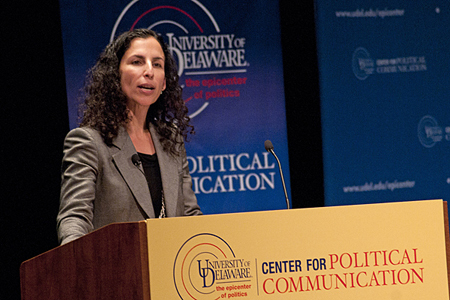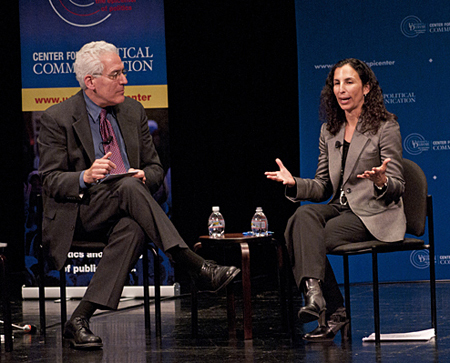Scandalous behavior
Political watchdog Melanie Sloan discusses past, present scandals

Offering a history primer on scandal in American politics dating back to the 18th century, political watchdog Melanie Sloan told a large National Agenda audience Wednesday, Nov. 2, that she sees growing public dissatisfaction with a dysfunctional government that is both for sale to the highest bidder and unable to tackle problems of substance.
Sloan is the founder and executive director of Citizens for Responsibility and Ethics in Washington (CREW) and a nationally recognized expert on congressional ethics. Her talk, presented in Mitchell Hall on the University of Delaware campus in Newark, was titled “Scandalous Politicians.”
Scandals swirled around Alexander Hamilton, who had an affair with a married woman named Maria Reynolds; Thomas Jefferson, who had a relationship with the enslaved Sally Hemings; and Grover Cleveland, who had an illegitimate son.
Post-Cleveland, Sloan said there came a period in which personal lives were seemingly off limits in political discourse, providing cover to presidents including Franklin Delano Roosevelt, Dwight D. Eisenhower and John K. Kennedy.
By 1974, she said, “sex was back on the radar” with Democratic Congressman Wilbur Mills pulled over by U.S. Park Police in the wee hours of the morning accompanied by a stripper, Fanne Foxe.
Sloan said any “lingering hesitation” about media reporting on private lives disappeared in 1987 when married presidential candidate Gary Hart was snapped in a photograph with mistress Donna Rice aboard the yacht Monkey Business. And that was followed by the various scandals surrounding Bill Clinton.
It became clear that such behavior could cost you not only your reputation but your job, Sloan said. But she asked, “Are they actually important? They’re delicious, we enjoy them, they sell copy. But are we missing the real problem, which is special interests’ hold on Washington?”
Non-sexual scandals, too, have a long history, from the Whiskey Ring to Tammany Hall to Teapot Dome, with Richard Nixon’s Watergate “the granddaddy of all political scandals,” one that led to impeachment and resignation.
That did not end things, however, with Sloan citing Ronald Reagan and the Iran-Contra affair and Clinton with Whitewater.
To combat misbehavior among elected officials, Sloan started CREW in 2003. The goal was to use the legal system to target politicians involved in illegal activities that don’t have the public interest at heart. “Our mission is to demonstrate to the public that some politicians are not working in their best interest,” she said.
CREW’s initial target was Republican Congressman Tom DeLay, who represented the 22nd congressional district in Texas from 1984 until 2006 and who was the GOP’s House Majority Leader from 2003-05.
“Tom DeLay was one of the most corrupt members ever to walk the halls of Congress,” Sloan said, and on his watch “pay to play” became standard operating procedure in the House of Representations.
She said attacks by CREW helped bring down one of Washington’s most infamous figures, with DeLay resigning because of money laundering charges for which he later was convicted.
Although that was a victory for CREW, Sloan said it was not the end of the battle because “DeLay was only part of a corrupt system.”
As such, CREW continues its vigilance, each year publishing a list of the “most corrupt” members of Congress. In 2010, the ineffective congressional ethics committees made the list.
Sloan believes that the worst is not behind us, saying, “The biggest scandals are still on the horizon.” The reason? Money.
It now costs about $1.4 million to win a House seat and about $9 million to win a Senate seat. “That money has to come from somewhere,” she said, with special interests and lobbyists — who know they will be remembered — most able to provide support.
“Americans are rightly concerned about the role of money in politics,” Sloan said, adding that is “something the Tea Party and Occupy Wall Street have in common.” She later said in response to a questioner seeking a measure of reassurance that “Congress is for sale.”
With federal election funding rules changed dramatically following the Supreme Court’s 2010 Citizens United v. Federal Election Commission decision, Sloan said super PACS (Political Action Committees) will be major players for both parties, with several closely associated with individual candidates — Priorities USA Action allied with President Obama and Restore Our Future with Republican presidential candidate Mitt Romney.
“The majority of money is being spent not by candidates but by the super PACS associated with them,” Sloan said.
Your vote counts

The American public cannot really count on Congress cleaning things up, Sloan said. “At this point, there is no political will for reform. Congress is not that interested in reforming itself.”
The answer lies in political engagement by the American public, she said.
Eternal vigilance is the price not just of liberty, Sloan said, but also of democracy. “We get the government we deserve,” she said, encouraging Americans to insist that politicians serve the public in an ethical manner and to refuse to reelect those who do not.
Voters should pay attention to what is happening, participate in town hall meetings and not accept business as usual, Sloan said, asking that people not fall for political ads — even those for candidates they like.
Most important, she said, people must vote. “Vote, because your vote really does matter. Politicians are making decisions that affect every aspect of your life every single day.”
If there is one thing politicians care more about than money, Sloan said, it is losing their seats.
Sloan sees hope in the level of dissatisfaction among Americans today. “Our system of government seems to be imploding,” she said. “It can’t do anything about anything. There is so much dissatisfaction with Washington.” Perhaps enough that voters will decide to take action.
Elected officials are rightfully concerned about being kicked out of office in 2012, Sloan said, adding she would like to see all of them given the boot to show that the interest of the public, not just their top contributors, is of paramount importance.
The 2012 elections are “not about party — they’re about incumbency,” Sloan said, and she can see a scenario in which voters rise up in a “tsunami” for change.
National Agenda series
The 2011 National Agenda speaker series, sponsored by the Center for Political Communication, is titled “Girding for Battle: Political Movers and Shakers at the University of Delaware.”
National Agenda lectures are held at 7:30 p.m., Wednesdays, in Mitchell Hall and moderated by Ralph Begleiter, director of the Center for Political Communication.
The series will conclude Nov. 16, with New Jersey Gov. Chris Christie, a UD alumnus. The doors will open at 6:30 and people will be seated on a first come, first served basis.
